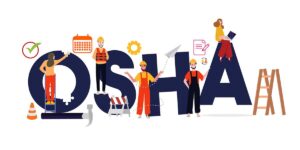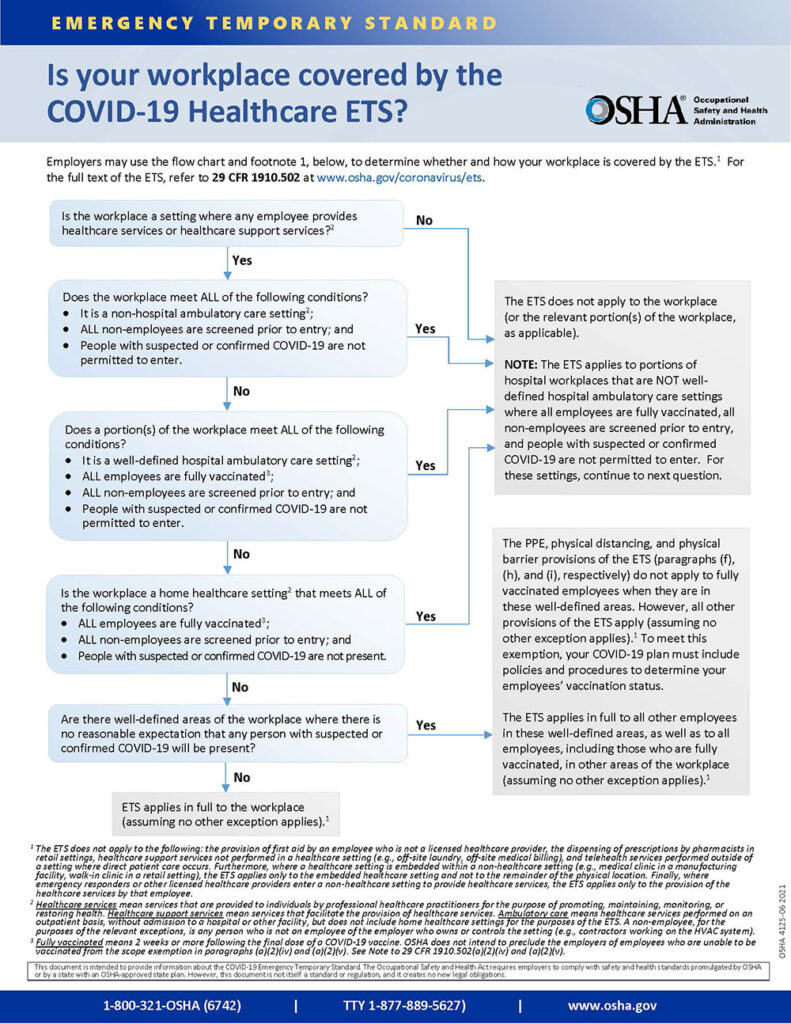***Updated July 11, 2022***
OSHA has extended its revised COVID-19 National Emphasis Program based on data that shows hospitalizations due to the virus “may increase significantly in the coming weeks.”
The NEP is focused on high-hazard industries such as health care and meat and poultry processing and ensures that employees are protected from contracting COVID-19. It was originally set to expire July 7.
“The Centers for Disease Control and Prevention has reported increasing coronavirus hospitalization rates nationwide since mid-April, and data forecasts that hospitalizations may increase significantly in the coming weeks,” OSHA said in a June 30 press release.
“This increase in hospitalizations reinforces the need for OSHA to continue prioritizing inspections at workplaces with a higher potential for coronavirus exposures, such as hospitals, assisted living facilities, nursing homes, and other health care and emergency response providers treating patients with coronavirus.”
The NEP was revised in July 2021 to incorporate OSHA’s emergency temporary standard on COVID-19 for healthcare workers. It also focuses on COVID-19 related complaints, referrals, and severe incident reports.
As part of the renewed emphasis program, OSHA will temporarily increase its COVID-19 inspection from 5 percent of all inspections to 10 percent.
Since the pandemic began, OSHA has issued more than 1,200 COVID-19 related citations with assessed penalties equaling out to around $7.2 million.
According to OSHA, the agency has “obtained relief for more than 400 employees who filed coronavirus retaliation claims against employers, exceeding $5 million in monetary awards to employees.”
The NEP will be extended until further notice.
—
***Original post from July 12, 2021 ***
The Occupational Safety and Health Administration has revised its National Emphasis Program for COVID-19.
The National Emphasis Program went into effect in March 2021, focusing on companies that put the largest number of employees at risk for the coronavirus, as well as for employers that engaged in retaliation against whistleblowers.
What changed under the revised National Emphasis Program?
The update revised target industries based on an evaluation of inspection and illness data, which includes healthcare and non-healthcare industries, such as meat and poultry processing.
The revised National Emphasis Program also removed a list of Secondary Target Industries from the program appendix. When it comes to healthcare inspections, the program now refers compliance safety and health offices to the new directive Inspection Procedures for the COVID-19 Emergency Temporary Standard, issued on June 28.
Non-Healthcare Inspections
Inspections for non-healthcare industries will follow new procedures outlined in the updated Interim Enforcement Response Plan, or IERP (this is different from the National Emphasis Program).
These new updates include:
- Enforcing protections for workers in non-healthcare industries who are unvaccinated or not fully vaccinated
- Where respirator supplies and services are readily available, OSHA will stop exercising enforcement discretion for temporary noncompliance with the Respiratory Protection standard based on employers’ claims of supply shortages due to the COVID-19 pandemic
- OSHA will no longer exercise enforcement discretion for the same requirements in other health standards, where full compliance may have been difficult for some non-healthcare employers due to the COVID-19 pandemic
- Updated instructions and guidance for OSHA area offices and CSHOs for handling COVID-19-related complaints, referrals, and severe illness reports
- Ensuring workers are protected from retaliation
The goals for inspectors in these workplaces are to identify COVID-19 exposures, ensure appropriate hazard control measures are implemented, and to make sure to identify and address any violations of the general duty clause and OSHA standards (other than the ETS). This updated plan is only meant to remain in effect until further notice during the current COVID-19 public health crisis.
Health employers must already comply with most provisions and have until July 21, 2021, to comply with training, ventilation, and barrier provisions.
Does the ETS apply to you?
The ETS applies to health care and health support services, which includes hospitals, nursing homes, and assisted living facilities. There are some exceptions, such as “non-hospital ambulatory care settings” where non-employees are screened for COVID-19 before entering.
Check out OSHA’s published flowchart (link below) to see if your workplace is covered by the ETS.
***
About Worksite Medical
In most cases, OSHA requires medical surveillance testing, and at no cost to employees.
Worksite Medical makes that program easier with mobile medical testing.
We conduct on-site respirator fit tests, as well as audiometric exams, pulmonary function tests and heavy metal lab work, right on your job site. We also keep accurate, easy-to-access medical records for your convenience. You’ll keep your employees at work, and stay ahead of OSHA inspections.
With Worksite Medical, a mobile medical testing unit — we can bring all the resources of a lab to you. Our certified lab technicians can perform both qualitative and quantitative respirator tests to ensure a perfect fit.
Protect your team and your workplace now with Worksite Medical. Not sure what you need? Try our medical testing wizard here.
Give us a call at 1-844-622-8633, or complete the form below to schedule an on-site visit or to get your free quote!





